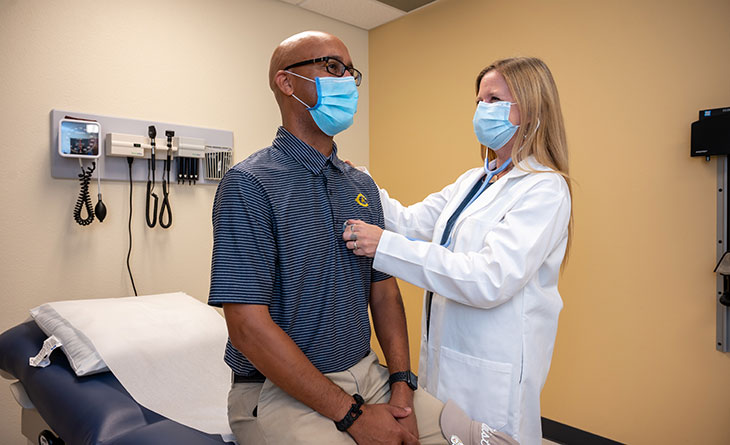Primary Care Provider: Your Relied On Resource for Healthcare
Primary Care Provider: Your Relied On Resource for Healthcare
Blog Article
Understanding the Essential Function of Primary Care in Comprehensive Wellness Administration and Illness Avoidance Techniques
The indispensable duty of main care in extensive health management and disease prevention strategies can not be overstated, as it offers as the structure for reliable medical care delivery. By focusing on preventative care and fostering long-lasting patient-provider relationships, key treatment professionals are distinctively positioned to resolve private health demands while likewise influencing wider neighborhood health end results.
Meaning of Primary Treatment
Although the idea of health care might vary across different medical care systems, it basically refers to the first factor of get in touch with for patients within the medical care continuum. Medical care encompasses a broad variety of solutions, including precautionary treatment, medical diagnosis, treatment, and monitoring of chronic problems. It is characterized by its comprehensive, obtainable, and coordinated strategy, guaranteeing people receive alternative care customized to their individual requirements.
Primary care companies, often family doctor, internists, or pediatricians, play a critical role in developing ongoing patient-provider connections. This connection of care fosters count on and promotes better health results via regular tracking and customized treatments. The emphasis on a patient-centered method enables the consideration of social, economic, and emotional aspects that affect health.
Additionally, medical care serves as a crucial part in navigating the healthcare system, assisting people via specialized solutions when necessary. By serving as a main center for wellness monitoring, medical care not only addresses immediate medical issues however likewise highlights the relevance of total health and preventative measures. Hence, its interpretation expands past plain therapy to incorporate an extensive framework for health promotion and disease prevention.
Benefits of Preventive Treatment
Preventative treatment deals numerous benefits that significantly improve private and community health outcomes. By concentrating on the avoidance of conditions and wellness concerns prior to they develop, precautionary care lowers the occurrence of severe health and wellness conditions, thereby decreasing medical care expenses over time. Early discovery with regular testings and evaluations permits prompt interventions, which can stop the development of conditions, causing enhanced high quality of life for individuals.
Moreover, precautionary treatment advertises health education and learning and understanding, encouraging individuals to make informed decisions concerning their way of lives and health actions. This positive approach urges routine exams, vaccinations, and wellness screenings, which not just profit individuals yet likewise add to the general wellness of the neighborhood. By lowering the worry of chronic conditions and stopping break outs of infectious illness, precautionary treatment plays a critical role in improving public wellness.
In addition to enhancing specific health results, preventative care promotes an extra efficient health care system by lessening the demand for comprehensive therapies and hospital stays. Inevitably, buying precautionary care is necessary, as it promotes healthier populations, decreases health and wellness differences, and makes certain better resource allotment within the health care system.
Role in Chronic Illness Monitoring
The aggressive methods used in preventive treatment are instrumental in the management of chronic diseases, which frequently call for continuous interest and sources. Health care carriers play a crucial role in this context, serving as the first point of contact for patients with persistent problems such as diabetes mellitus, hypertension, and heart problem. They are crucial in developing customized monitoring strategies that include routine monitoring, drug monitoring, and way of life adjustments.

Additionally, main home care carriers often use technology and information analytics to track person progression and recognize possible issues early. This proactive monitoring boosts person involvement and equips individuals to take an active role in their health management. Ultimately, the assimilation of medical care right into chronic disease monitoring cultivates better lifestyle and decreases the concern on healthcare systems.
Patient-Provider Relationships

Additionally, a durable patient-provider relationship boosts patient interaction and self-management. Carriers that invest time in understanding their clients' histories, choices, and inspirations are much better furnished to sustain them in handling their conditions. This individualized technique can cause enhanced health and wellness results, as clients are much more likely to follow recommendations when they feel valued and understood.
Additionally, connection of treatment plays a considerable function in strengthening these relationships. Normal communications between clients and suppliers assist in continuous assessment and adjustments to therapy strategies, which is vital for taking care of chronic diseases properly. This connection not only advertises better health end results however also minimizes healthcare costs by reducing the requirement for urgent treatments.
Effect On Area Health
Strong patient-provider partnerships substantially influence neighborhood health results, as they add to a much more involved and notified populace. pcp dr near me. When clients really feel connected to their medical care carriers, they are more probable to seek preventative services, comply with therapy plans, and join health-promoting habits. This engagement cultivates a culture of wellness, where people prioritize their health and the health of their neighborhood
Furthermore, efficient interaction between patients and service providers enhances health proficiency, encouraging individuals to make informed choices concerning their care. This increased understanding can lead to reduced prices of persistent illness, as clients become aggressive in handling their health and wellness. Furthermore, strong relationships promote the recognition of community-specific health and wellness challenges, enabling providers to customize interventions that attend to neighborhood requirements.
In addition, main treatment offers as an important access point for health and wellness resources, attaching people with essential solutions and support networks. This thorough skin doctor near me strategy not just improves specific health and wellness but additionally enhances neighborhood communication, as locals function collaboratively to deal with wellness disparities. Overall, the effect of durable patient-provider connections expands beyond the center, fostering healthier areas and mychart cleveland clinic contributing to a sustainable medical care system.
Final Thought
In summary, key care is fundamental to effective wellness monitoring and condition prevention. By highlighting preventative care and chronic illness monitoring, primary care promotes early detection and tailored treatment plans. Strong patient-provider partnerships foster trust and enhance adherence to health and wellness referrals. Inevitably, the integration of primary care into neighborhood wellness strategies causes boosted health outcomes and decreased medical care prices, emphasizing its vital role in promoting overall neighborhood wellness.
Report this page